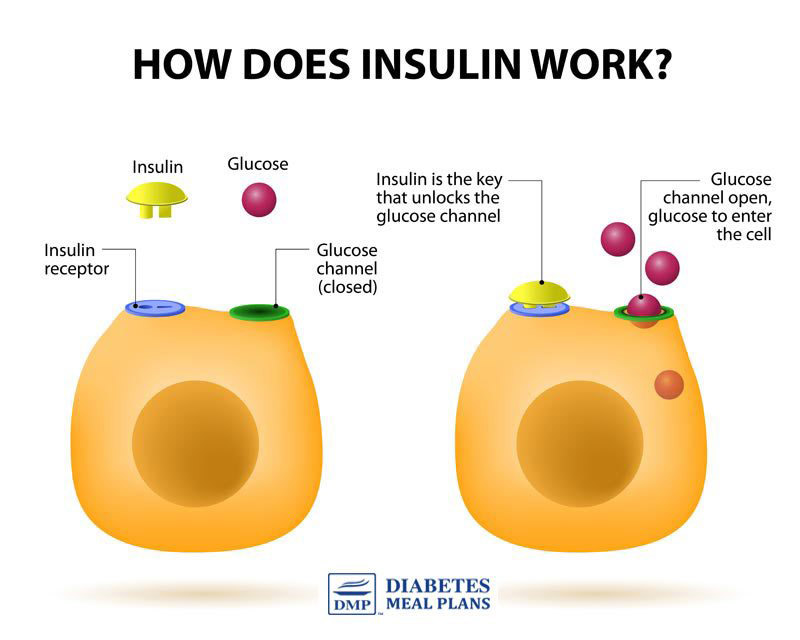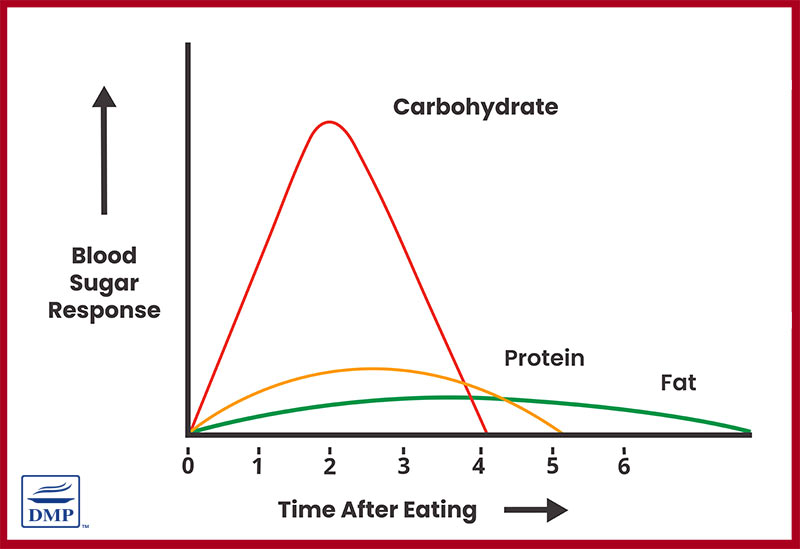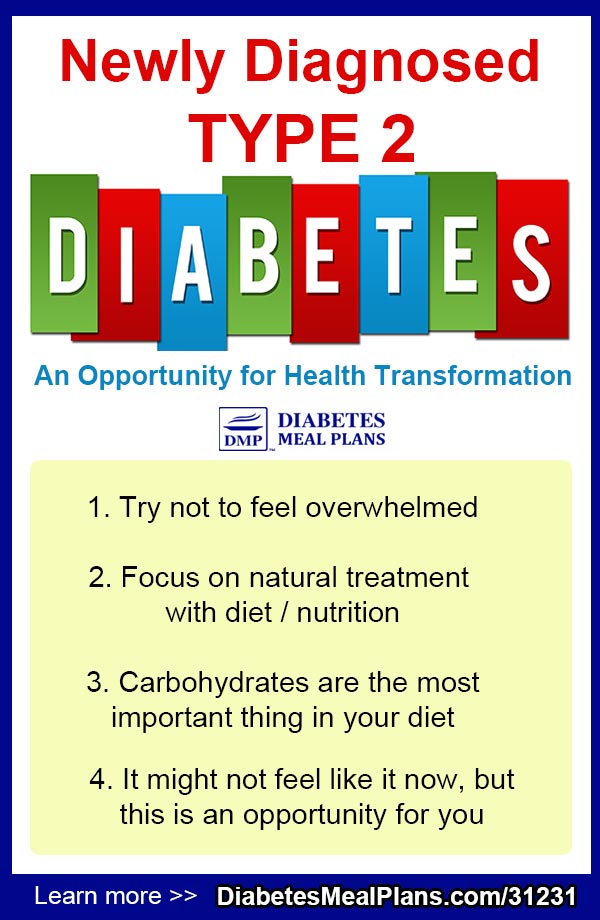If you’re newly diagnosed with type 2 diabetes, it can all feel very overwhelming.
Then you get online and start looking for info and it can all get even more confusing because one place says this and another says that – there’s so much conflicting information on the wild west web!
We understand. We’ve been helping people with type 2 diabetes for a long time and we know how confusing and overwhelming it can be at first. So, please don’t panic – let us help you get started on the right track.
We’ll start with some brief information about what type 2 diabetes is, and then provide proven steps for reversing your diabetes.
What Is Type 2 Diabetes?
Type 2 diabetes is a condition that affects the way your body metabolizes sugar (glucose).
In type 2 diabetes, your body resists the effects of insulin — a hormone that regulates the movement of sugar into your cells. Imagine insulin as a key that unlocks your cells, but then the key breaks or doesn’t fit the lock, so it stops working. This is known as insulin resistance and is the most common cause of all diabetes.

In some cases, the body doesn’t produce enough insulin to maintain normal glucose levels (not as common, unless you are further along in a diagnosis and haven’t been proactive with your health).
Difference Between Type 1 and Type 2 Diabetes
Type 1 diabetes is a genetic condition, an autoimmune condition that can get triggered by various environmental factors igniting an autoimmune response that leads to the destruction of pancreatic islets (cells in the pancreas) and the failure of insulin production.
All people with type 1 diabetes need insulin replacement therapy because the pancreas simply can’t produce any insulin.
Type 2 diabetes can have a strong genetic predisposition, so if there is a history in your family, you could be at higher risk of getting type 2 diabetes. However for most people, type 2 diabetes is predominantly a result of insulin resistance, which develops slowly due to unhealthy diet, weight gain, stress, physical inactivity and environmental factors.
People with type 2 diabetes may need medication and sometimes insulin, but you can avoid medication and you can also reduce and stop medication once you start taking it. We know because we’ve helped many people reduce and stop meds, with our natural treatment methods.
What To Focus On First?
The first place to focus on is improving your diet/nutrition.
The food you eat is very powerful, as it can help you reverse your diabetes so your body is functioning normally – normal blood sugar, cholesterol, liver function, blood pressure, digestive function – yes, all these things can be improved as they are all connected!
The thing is, while medication can be helpful, depending on medication alone is not a great option because if you have to take more and more medication, it indicates your diabetes is getting worse.
On the other hand, if you focus on improving your diet/nutrition, you can stop your diabetes getting worse, reduce or eliminate your medication, and live your best life!
Retha (VIP Member) said: “This way of eating works. Sugar numbers are down and Dr. has taken me off one of my medicines for 3 months to see how I will do.”
Listen to Type 2 Diabetes Talk with Dr Jedha
Cut Out Or Minimize High Sugar Foods
One of the easiest places to start by improving your diet is by cutting down or cutting our processed and packaged foods that are high in ‘added sugar.’ Think: soft drinks, candy, baked goods like cookies and cakes, and breakfast cereals.
Listen to Type 2 Diabetes Talk with Dr Jedha
Episode 8: 7 Effective Ways To Tame Sugar Cravings – especially tip #7!
Focus On The Carbohydrates In Your Diet
There are a lot of ‘terms’ out there, so just to be clear: Carbohydrates are sugars, sugars are carbohydrates. Both carbohydrates and sugars break down to glucose in the bloodstream.
Focus on learning everything you can about carbohydrates because this is the nutrient that influences blood sugar and A1c the most, as you can see in the picture below.

Very high carb foods are called ‘starches’ and include things like pasta, noodles, rice, bread, and starchy vegetables like potatoes, sweet potatoes and corn. If you can start by reducing these foods you will be well on your way to improving your blood sugar levels.
Grab a copy of our recommended food list for the types of foods to include and avoid.
At first this might sound like you will be able to eat nothing. Please don’t feel that way.
Believe us when we say there are PLENTY of things to eat. You’ve just got to get to know a new way of eating, and anyone can do it – even you!
Elizabeth (VIP Member) said: “The information, the recipes, the support – I don’t feel so hopeless. I love the fact that it all reminds me that I can still eat! I just love how much clear, understandable information is available. I appreciate the very quick responses I have received from my emails. Excellent resource! Thank you so much!!”
And just one other point: Calories are not so important as the quality of the foods you eat – focus on fresh natural foods and work on cutting out all the processed stuff.

Embrace Your Diagnosis As An Opportunity!
It might be overwhelming now, but it won’t be – you can do this! Like many people before you.
Taking care of your health will give you so much freedom in the world, so that you can continue doing all the things that you want to do in this life. This is an opportunity for you to transform your health and get to a place where you’ve never felt better – how good will that be?!
The other thing that’s great about being newly diagnosed, is that research shows this is the best time to take charge of your health and avoid diabetes complications – that is really important because some of them can be awful, even life-threatening.
Please don’t feel overwhelmed. Be patient with yourself. Take it one step at a time. But know YOU CAN DO THIS – and we are here to support you!!
This is your opportunity for a health transformation so embrace it and enjoy it!
Importantly, the best advice is to start from where you are and just work on something. It’s even worse if you get stuck and do nothing.
View our Recommended Food List
Totally confused by everything?
Take Dr Jedha’s clinically proven T2Diet Program.
The 16-week online program is clinically proven in a randomized controlled trial to lower A1c, help you lose weight if you need to, and reduce diabetes medications in 87% of program participants.
As a newly diagnosed person with diabetes, the program will give you all you need to know to achieve results now, and maintain them to protect your health long term.


Ruth Mary Clemens
YOU BLITHLY SAY THERE WILL BE PLENTY OF FOODS TO EAT BUT I beg to differ. I am one of the world’s pickiest eaters, always have been and at 79+ I doubt that is going to change. I do not eat fresh fruits with the exception of bananas and apples. I will not eat cooked apples but love unsweetened applesauce. Veggies I eat such as peas, baby limas, corn, potatoes, white red or sweet, are starchy with the exception of green beans. Even the lettuce I eat is frowned on because it is iceberg. Rice, wheat breads, wheat pasta are not on that list but white bread and white pastas are. Add raisins–too sweet–beets–carrots are okay. I love sweets as in ice cream and cakes, donuts, cinnamon rolls, etc. Not yogurt, not fruits, Even my doctor said I was between a rock and a hard place. Now I can leave the brown sugar and marshmallows off the sweet potatoes–big help. I drink soda or iced tea, unsweetened. I went through the class and wanted to strangle the leader, a woman built like a stick who kept pushing avocados–no thanks–and then ended the class with “you can still have sweets. Buy those bags with little mini cookies s and just eat two at a sitting”. There was where I lost it.
Dr Jedha
This is challenging and there will be some exceptions such as in your case Ruth. No general class or information is going to solve that challenge unfortunately, as you’ve discovered. In cases like this we always recommend working one-on-one with an experienced nutritionist who can assist with a personalized plan.
Amanda
Hi very high health anxiety and chronic stress has given me diabetes , what can l do to reverse this 😢
Emily - Dietitian (MS, RD)
Hi Amanda – it seems like a big thing for you will be working on techniques to manage anxiety and reducing cortisol levels. This can be achieved through talk therapy, mindfulness/meditation, gentle exercise, journaling and in some cases anti-anxiety medication. In addition to working on stress levels, it would be in your best interest to adopt a lower carbohydrate diet, which you can read more about here. Let us know what other questions you have!
Maudeline Evans
Would cutting carbs let me loose weight? Am 130lbs and 5’8” tall. Would like to weigh 140lbs. I eat well, so not sure what to do, as I don’t want to loose any more.
Dr Jedha - Nutritionist (PhD)
Cutting carbs can help people lose weight but there are ways to gain as well. You might find this info helpful.
Angela Brown
My A1C is 6.2 and my doctor prescribed Prednisone 50mg for three days. After doing some reading. I found that this pill will raise my blood sugar. I’ve already taken the pills. Should I take this pill in the future if prescribed? Thanks.
Dr Jedha - Nutritionist (PhD)
Hi Angela, Prednisone is a corticosteroid and these can raise blood sugar levels, however, sometimes they may be necessary to treat a condition. This is something you need to discuss with your doctor.